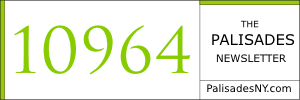A BIG PROBLEM IN OUR LITTLE RECYCLING BINS
We toss our empty Tide bottles, flattened Amazon boxes and rinsed mayo jars into the town’s blue and green bins and hope we are doing our part for the planet, but the success of a recycling ethos and recent global changes mean our good intentions are sadly irrelevant. We simply generate too much waste - recyclable and otherwise - and the time has come to rethink our habits.
“We’ve got a global waste problem,” says Kerri Scales, Education Coordinator for Rockland County Solid Waste Management Authority. China’s recent import ban on recyclables has left many countries, including the U.S., with limited markets for recyclables. “We need the help of everyone in the community to become more familiar with what can be tossed into those green and blue bins so we can focus on recovering the most marketable materials,” says Scales.
According to The New York Times, Americans generated roughly 66 million tons of recyclable material in 2018. In Rockland, our portion of that pile ended up at the Materials Recovery Facility (MRF) in Hillburn, about a 30-minute drive north of Palisades. The MRF is a publicly owned, privately operated facility where our recyclables are sorted – mostly by hand – and baled into giant ragged rectangles of mixed paper, plastic, cans and cartons. The bales are shipped to processing facilities in the U.S. and overseas. Anything non-recyclable is deemed trash and trucked to one of three state transfer stations. The accumulated tonnage is then trucked an- other 300 miles to a landfill.
Although sorting, baling, trucking and disposal have associated costs, they are offset by sales. “Thankfully we are still able to find markets for our material,” says Scales, attributing the Hillburn facility’s solvency to a dual stream operation, which produces a carefully sorted, high quality product. But recycling is no longer the cash cow it once was. “In these market conditions, even the best run MRF won’t find markets for material no one wants,” she adds. So how can we lighten this megaton problem curbside?
Recycling rules can vary by county and state so it’s best to get educated about the rules in Rockland County. Because Rockland’s MRF is a dual stream facility, residents and businesses must keep paper items separate from cans, bottles, plastics and cartons. Placing these items in separate bins helps to minimize contamination and makes it easier for workers to sort properly. As a general rule of thumb, it is easier to recycle plastics with a lower number stamped inside the recycling symbol on the bottom.
Anything not on the list below ends up in a landfill!
GREEN BIN
Glass bottles (green, clear, brown)
Aluminum and steel cans
Aluminum foil, aluminum pie plates and roasting pans
Milk cartons and drink boxes (Keep caps on)
Plastic containers (kitchen, laundry and bath products)
Large rigid plastics (laundry baskets & 5-gallon pails)
BLUE BIN
Newspaper
Office paper, folders
Junk mail, envelopes Catalogues, magazines, paperback books
Shredded paper (place in paper bags)
Cardboard, paper bags, cereal & tissue boxes (flattened and cut into 3' x 3' pieces)
The facility does not accept ANY plastic bags including plastic grocery bags, pharmacy bags, shopping bags, produce bags, dry cleaning bags, sandwich bags etc. Film plastics get tangled in the sorting equipment, requiring the facility to shut down so that they can be manually removed. This increases processing costs and poses a safety threat to workers. In New York, residents can recycle plastic grocery bags and other film plastics at supermarkets and large retailers.
Other unacceptable items for recycling bins such as electronics, medications, batteries and paint can be dropped off at the Household Hazardous Waste facility at 35 Firemen’s Memorial Drive in Pomona.
Finally, ensuring that your recycling actually gets recycled is terrific, but, of course, the best solution is to generate less waste. This can be daunting, but here are a few suggestions:
• Carry tote bags in your car for groceries. Remember to put them back in the car after you’ve unloaded!
• Carry a small nylon bag in your purse for smaller purchases.
• Don’t take a bag if you don’t need it
• Make purchasing decisions based on the manu- facturer’s packaging choices – Is it recyclable? Is
it minimal? Is it reusable?
• Ask your favorite stores to consider changing
some of their packaging habits.
• Contact companies whose products you like and
ask for less wasteful/more eco-friendly packaging
design.
• Carry a refillable water bottle
• Educate your children/friends/family about all of the above.
It can be hard to adopt some of these practices, a fact no one understands better than Scales, but she insists that each one of us can have an impact on this looming global problem, and that awareness is the first step to creating solutions. She points out that even a few simple modifications can help ease the enormous stress we place on our planet. “You can change what you’re doing on a daily basis,” she says, “and make a difference.”
More information on recycling and hazardous waste disposal in Rockland is available at www.rocklandrecycles.com. There is also a calendar for a nifty thing called the Repair Cafe, a worldwide organization facilitating gatherings in the Hudson Valley where local repair experts will fix your lamps, toaster ovens, blenders, chairs and more…for free! You can also follow the Authority on social media at GreenUpRockland.

